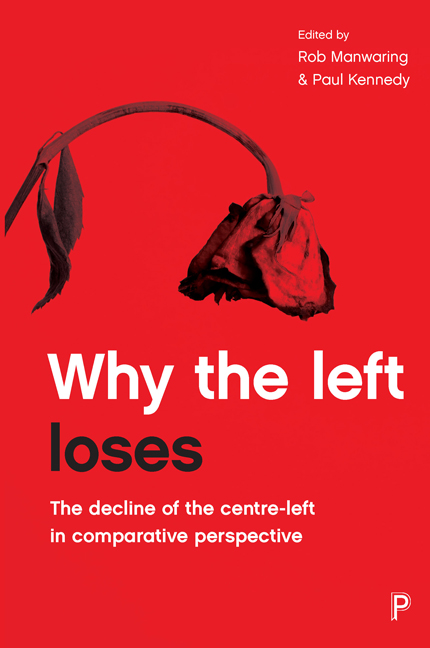Book contents
one - Why the left loses: understanding the comparative decline of the centre-left
Published online by Cambridge University Press: 08 April 2022
Summary
Introduction
Since the global financial crisis (GFC), if not before, there has been a general decline in the fortunes of social democratic and labour parties. Against these recent developments, there is a long-standing literature that appraises the electoral performance and impact of the left more broadly (Przeworski and Sprague, 1986; Kitschelt, 1994; Moschonas, 2002). Much of the literature on social democracy tends to be pessimistic, and there is a plethora of research that denotes recent developments as a ‘crisis’, on the ‘back foot’, ‘in retreat’, and perhaps most arrestingly, as ‘dead’ (Gray, 1996; Pierson, 2001; Keating and McCrone, 2013; Lavelle, 2013; Ludwigshafen et al, 2016). In a prescient address at the London School of Economics and Political Science (LSE) in 2011, David Miliband catalogued the general wreckage of the electoral fortunes of the centre-left across Western Europe. In his critical survey of European social democracy, he noted:
• The UK General Election in 2010 – the second worst result for Labour since 1918.
• Sweden, also in 2010 – the worst result since 1911.
• Germany in 2009 – the worst result since the founding of the Federal Republic, with a greater loss of support than any party in the history of the country.
• France in 2007 – the worst result since 1969.
• The Netherlands in 2009 – a traumatic transition from a junior coalition partner to Opposition.
• Italy – a yo-yo in and out of power, with personal and political divisions disabling opposition to Berlusconi.
More recent results generally confirm this overall trend, with British Labour losing both the 2015 and 2017 general elections. The Dutch general election in early 2017 saw the worst-ever result for the Dutch Labour Party (PvDA, Partij van de Arbeid). The PvDA lost 29 seats, only holding 9 in the 150-seat Parliament. The Dutch result is something of an outlier for the misfortunes of the centre-left. Later in this chapter we survey the state of the left more widely.
This collected volume investigates the electoral fortunes of the family of centre-left labour and social democratic political parties. In this chapter we set out the aims and scope of the volume, and its contribution to understanding the comparative political decline of the centre-left. After mapping the electoral fortunes of centre-left political parties, we then locate this volume in the current literature, and set out the distinctive approach offered here.
- Type
- Chapter
- Information
- Why the Left LosesThe Decline of the Centre-Left in Comparative Perspective, pp. 5 - 22Publisher: Bristol University PressPrint publication year: 2017



